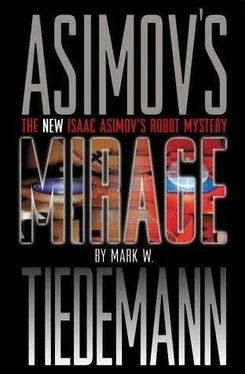Mark Tiedemann - Mirage
Здесь есть возможность читать онлайн «Mark Tiedemann - Mirage» весь текст электронной книги совершенно бесплатно (целиком полную версию без сокращений). В некоторых случаях можно слушать аудио, скачать через торрент в формате fb2 и присутствует краткое содержание. Год выпуска: 2000, ISBN: 2000, Издательство: IBooks, Жанр: Фантастика и фэнтези, на английском языке. Описание произведения, (предисловие) а так же отзывы посетителей доступны на портале библиотеки ЛибКат.
- Название:Mirage
- Автор:
- Издательство:IBooks
- Жанр:
- Год:2000
- ISBN:ISBN: 0-671-03910-5
- Рейтинг книги:5 / 5. Голосов: 1
-
Избранное:Добавить в избранное
- Отзывы:
-
Ваша оценка:
- 100
- 1
- 2
- 3
- 4
- 5
Mirage: краткое содержание, описание и аннотация
Предлагаем к чтению аннотацию, описание, краткое содержание или предисловие (зависит от того, что написал сам автор книги «Mirage»). Если вы не нашли необходимую информацию о книге — напишите в комментариях, мы постараемся отыскать её.
Mirage — читать онлайн бесплатно полную книгу (весь текст) целиком
Ниже представлен текст книги, разбитый по страницам. Система сохранения места последней прочитанной страницы, позволяет с удобством читать онлайн бесплатно книгу «Mirage», без необходимости каждый раз заново искать на чём Вы остановились. Поставьте закладку, и сможете в любой момент перейти на страницу, на которой закончили чтение.
Интервал:
Закладка:
"Thanks, I really appreciate it," he said.
The nearer one glared at him. "Your boss needs to learn a little circumspection."
Derec shrugged. "Well…"
"Have a good day, sir."
They lifted off and Derec staggered back from the wash of hot, compressed air. He wondered how much of a report they would file.
Derec caught up with Ariel at the elevator.
"That was-"
She shot him a look. "Unnecessary?"
"-masterful."
She frowned briefly, then laughed. "Those poor…"
The elevator door opened, letting three people out. Ariel did not finish her thought. "All the log recorded was date, destination, and distance," Derec announced. "It was used once in the last eleven months."
"Union Station?" Mia asked.
"Correct. And directly back to that garage. There's no record of the driver, the medical technicians, or the patient."
"No surprises, then," Ariel said.
"But it's confirmation," Mia said, nodding. She pointed at the crate on the end of the table. "What's in that?"
Derec felt inexplicably reluctant to open it. He looked at Ariel, his heart pounding. "Do you still have that key?"
Ariel handed him the seal key from the warehouse. Derec switched it on and ran it along the seam. The crate lid popped open.
Nestled within padding lay a plastic-wrapped mound of silver-and-gold webbing, wrapped tightly and mingled with darker nodes.
"Damn," Ariel hissed.
"What is it?" Mia asked.
"A positronic brain," Derec said. "Absolute contraband."
"Close it up," Ariel said.
Derec complied, then looked at Mia. "You called the police, didn't you?"
Mia nodded. "Something came up. I had Bogard issue a dispatch through their channels. Not much, just a cruiser to go look-see."
"Bogard is just full of tricks," Ariel said icily. "Pity it couldn't do its primary job as well."
Derec looked at her. She was staring at Bogard, arms folded, an expression of unconcealed resentment on her face.
"You sent me a message," Derec said, "after the Incident. You said 'I see you got your wish. ' What did you mean by that?"
"You knew it was from me. Can't you figure out what it means?"
"Eliton's death was-"
"Beside the point. You got what you wanted by being able to create a dangerous robot. I don't think you wanted to kill Eliton. I think you wanted to build robots, any way you could, any way you wanted."
"How does that follow?" Derec asked. "With Eliton's death, no one will be able to build robots on Earth."
"I don't think it matters. Someone will hire you to build bodyguards now, no matter what."
"Excuse me, but I failed to do that."
Ariel waved her hand dismissively. "Glitches. No one on Earth would buy it, but Spacers understand that prototypes always have bugs to be worked out. It brought back three of the assassins. That's the point that won't be missed. You've got your opportunity to build your special positronics now. More leeway, more freedom of action, more humanlike. Hell, they'll even make mistakes."
"Ariel-"
"Pardon me," Mia said. "I feel like I've come in at the tail end of a very complicated argument."
"Derec and I disagree fundamentally over Bogard. What it represents."
"I gathered that much. Why?"
"Derec's robot here is the product of an attempt to circumvent Three Law programming-"
"That's a complete mischaracterization!" Derec shouted. "You never understood what I was after!"
"Really? Tell me something-why is that robot still functioning?"
"What? I don't-"
"It failed," Ariel snapped. "It let a human in its care die. It stood witness to dozens of fatalities and injuries. It should be a mass of collapsed positronic gelatin. Instead, it is fully functional."
"What good would it be if it had collapsed?"
"It would be inert. It would pose no further threat."
"What threat?"
"The threat of negligence!"
"It wasn't negligent! Look at how it performed for Mia."
"Then why is Eliton dead?"
"We don't know he's dead!"
"As far as Bogard is concerned, he is! Why?"
Derec did not know. Of everything he had intended in designing and building Bogard, that was precisely the thing which ought never to have happened. He looked at the unmoving, unmoved machine and wondered what had gone so profoundly wrong that it had allowed the human it was programmed expressly to protect to die.
"Would someone please explain this to me?" Mia asked.
"Derec built it, let him try," Ariel said in disgust.
"Under normal circumstances…" Derec started. His throat caught, and he coughed. "Normal circumstances… whatever that means… the Three Laws are built into every positronic brain, part of the core template. They represent the First Principles for a robot, the foundation on which all its subsequent learning and experience rests. The initial designers set it up so that almost all the secondary programming requires the presence of those laws in order to function. It would require a complete redesign of all the manufacturing methods as well as the basic pathways themselves to build a brain without the Three Laws. They aren't just hardwired into the brain, they are basic to the processes of constructing one."
"Is that what you did? Redesign everything?"
"No. I'm not that good. Nor am I that irresponsible. All I did was set in place a new set of parameters for the application of the Laws."
"You circumvented them," Ariel snapped.
"I did not. I took an accepted standard practice and stretched it."
"What practice?" Mia asked.
"Setting conditions of when the robot perceives that it is responsible for a violation," Derec explained. "Think about it. According to the First Law, if a robot followed it absolutely, all robots would collapse. 'A robot may not injure a human being, or, through inaction, allow a human being to come to harm. ' Consider that as an absolute. Human beings are always coming to harm. Time and distance alone guarantee that a robot can't act to prevent that harm in all cases. If some kind of buffer zone, a hierarchical response, weren't in place, the instant robots realized how many humans came to harm because they weren't doing something to prevent it, we would have no functional robot population. So we establish a reasonable limitation for its application. If a robot does nothing to stop the human it is standing right next to from being killed-say, by a speeding vehicle, out of control-then it fails and collapse follows. If that same robot can do nothing to prevent the same fate happening to a human a kilometer away from it, the only way it fails is if another human forcefully asserts that it was at fault. It does not automatically perceive itself as responsible."
Mia nodded. "That makes sense. "
"Practical engineering," Derec said. "But then we run into a functional brick wall when it comes to certain tasks. Law enforcement, for one. Most positronic brains cannot cope with violent crime. A few have been programmed to dissociate under very specific circumstances so that, say, witnessing dead humans at a crime scene won't create a Three Law crisis. But they still can't make arrests because that offers the potential of harm to a human being."
"But a criminal-" Mia began.
"Is still a human being," Derec insisted. "What a human has done by violating a law does not mitigate the robot's adherence to the Three Laws."
"Unless you redefine harm," Ariel said. "Which is how you got around the Three Law imperative."
"That's an oversimplification," Derec replied. "What I redefined was the sphere of responsibility. Bogard is just as committed to the Three Laws as any other robot, but it has a broader definition of that commitment. It can make the determination that limiting a human's freedom action, even if it results in a degree of harm-bruises or strained muscles, for instance-may prevent harm from coming to other humans."
Читать дальшеИнтервал:
Закладка:
Похожие книги на «Mirage»
Представляем Вашему вниманию похожие книги на «Mirage» списком для выбора. Мы отобрали схожую по названию и смыслу литературу в надежде предоставить читателям больше вариантов отыскать новые, интересные, ещё непрочитанные произведения.
Обсуждение, отзывы о книге «Mirage» и просто собственные мнения читателей. Оставьте ваши комментарии, напишите, что Вы думаете о произведении, его смысле или главных героях. Укажите что конкретно понравилось, а что нет, и почему Вы так считаете.












